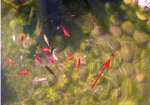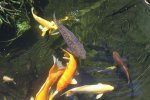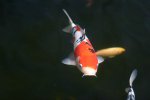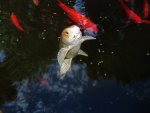That's a good theory, but the fish don't look oversaturated, and the tree and grass in the background look perfect to me. The greens of the grasses in that second shot would look just like the water if his processor was oversaturating the whole frame.
You are using an out of date browser. It may not display this or other websites correctly.
You should upgrade or use an alternative browser.
You should upgrade or use an alternative browser.
Pond Photo Tips
- Thread starter buckry
- Start date
My camera was and still is a Kodak DC280 digital, 2.0 mega pixel, limited settings. Many decades ago I did use a SLR with film and learn a little bit about film speed, shutter speed and aperture, but just a little.
I've looked at buying a new camera a few times but when I get to the camera department I realize I have no idea what to look for. Sounds like DSLR cameras have more controls, ability to change lenses. I assume to take the best pictures in different conditions you would need those controls and the ability to use them?
BTW, I've definitely had ponds that were anything but clear for years at a time. From green like paint to black gray like a septic tank.
I've looked at buying a new camera a few times but when I get to the camera department I realize I have no idea what to look for. Sounds like DSLR cameras have more controls, ability to change lenses. I assume to take the best pictures in different conditions you would need those controls and the ability to use them?
BTW, I've definitely had ponds that were anything but clear for years at a time. From green like paint to black gray like a septic tank.
A good consumer DSLR is a great tool, I think they start around $400 both in Nikon and Canon, and yes they have the manual controls so you can set it to a 10 second exposure or 1/2000. I wouldn't have been able to get a shot even close to the one of my pond last night with a point and click, but being able to set it just how I wanted on my DSLR gave me the shot. If you truly want to be able to photography any subject in any suroundings, this is the way to go.
That being said, there are tons of newer point and clicks with manual settings, and three are even more that don't have it, but dont' really need it. My point and click is a casio EX-ZR10. It doesn't have too many controls, but it nails shot after shot in full automatic, and the things I'm photographing with this camera that's the important thing.
Since we're talking about ponds, I'd say 9 times out of 10 we're photographing during the day, and that's a fairly easy time to photograph so a good quality point and shoot should be fine. The improvements made to digital cameras since the 2mp days are huge, any camera you buy is going to quadruple your photographic capabilities, both in exposure and color accuracy, autofocus speed, and image quality. I've got some shots of my entire pond, that I can zoom in on individual fish on the bottom and see their color markings clearly. These are 4" fish too, so that's saying something, and my camera was probably $250 2 years ago, very salty for a point and shoot, but it's got some good toys and an amazing video camera so that's what I was really buying it for.
That being said, there are tons of newer point and clicks with manual settings, and three are even more that don't have it, but dont' really need it. My point and click is a casio EX-ZR10. It doesn't have too many controls, but it nails shot after shot in full automatic, and the things I'm photographing with this camera that's the important thing.
Since we're talking about ponds, I'd say 9 times out of 10 we're photographing during the day, and that's a fairly easy time to photograph so a good quality point and shoot should be fine. The improvements made to digital cameras since the 2mp days are huge, any camera you buy is going to quadruple your photographic capabilities, both in exposure and color accuracy, autofocus speed, and image quality. I've got some shots of my entire pond, that I can zoom in on individual fish on the bottom and see their color markings clearly. These are 4" fish too, so that's saying something, and my camera was probably $250 2 years ago, very salty for a point and shoot, but it's got some good toys and an amazing video camera so that's what I was really buying it for.
- Joined
- Jun 22, 2011
- Messages
- 4,684
- Reaction score
- 3,764
- Hardiness Zone
- 5b
- Country

My camera was and still is a Kodak DC280 digital, 2.0 mega pixel, limited settings. Many decades ago I did use a SLR with film and learn a little bit about film speed, shutter speed and aperture, but just a little.
I've looked at buying a new camera a few times but when I get to the camera department I realize I have no idea what to look for. Sounds like DSLR cameras have more controls, ability to change lenses. I assume to take the best pictures in different conditions you would need those controls and the ability to use them?
BTW, I've definitely had ponds that were anything but clear for years at a time. From green like paint to black gray like a septic tank.
WB;
in checking around, so far there's a few answers, all of which would seem to contribute to your situation.
1. the eye/brain can adjusts to 'green casts' whereas the camera faithfully records exactly what it sees, so the pond must be green.
2. the sensor (Bayer) is biased with twice as many green cells as either blue or red
3. our eyes are very yellow-green sensitive
4. you must have a green algae bloom
5. without additional colors, i.e. a background which is different color or reflections like the sky, the green overwhelms the sensor and enhances the green
6. the color data recorded in the green channel is twice the red and 6 times the blue, so the cam can't compensate for green casts like it can for blue/yellow
7. cam might have trouble understanding the wb (white balance) UNDER the water and has it wrong.
8. explanation (I c/p'd because the explanation was a lot more technical and long):
Speculating here, but one explanation may be that the human eye and brain have the ability to accommodate itself to any colour cast, and to understand it and discount it to some extent. A camera can accommodate itself to only some kinds of colour casts, and understands nothing whatever.
We are still conscious that a colour cast is there, when viewing a scene directly, because of what we can see has happened to the objects that we already know. Our visual brain uses clues and cues in the scene to try to present to our awareness, each of these objects using some kind of neutralised colour idea - so we still think of red coloured fish, which would have looked red when seen in normal unfiltered daylight conditions, even though they are not being seen in those conditions, leading to a perhaps totally non-red colour mix striking our retina. Perhaps the thing that is least green among all the items in the pond, looks red to us, even though "being relatively least green" means it is here being presented as a greeny-orange when measured absolutely.
It's all a matter of context
richardplondon > colour-cast (Original)
Jun 30, 2012 07:50:24
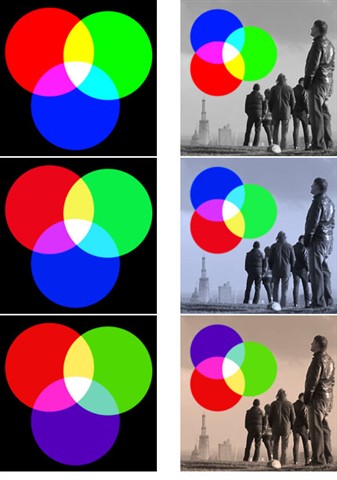
So a person looking at the pond is aware it is a green pond, and undoes some of that greenness mentally. With special training, for example painters can learn to suspend this process and appreciate hues more as they are objectively seen - to build the colour cast into a painting in such a way that the viewer of the painting gets the same kinds of cues and therefore the same distinctive experience that a person viewing the scene would have had. This allows mood and characteristic local lighting etc to be conveyed as well as the objective colour content of a scene (as you'd get if colour casts were entirely corrected for, or if it was illuminated artificially in a studio manner).
A camera can also accommodate itself to colour casts, in a similar way, using its Auto Whitebalance feature or WB presets etc. This works well for blue colour casts, for example shade or dusk-evening light, and it works well for yellow-orange colour casts, for example sunset or candle-light. The camera has a strong ability to work along that blue-amber colour temperature axis, aided by the ability to slightly tweak WB tint in the other axis, namely green-magenta to allow for e.g. fluorescent lighting.
My speculation is that even the best auto WB function is not going to have the correction power to neutralise away a green cast, to the same extent that it might succeed in doing for an orange pond or a blue pond, assuming that existed.
The problem we get when viewing a green-cast photo of a pond, is that due to the selectivity of a photo where we don't also see the surroundings of the pond, our eyes are not able to collect and use the same colour context cues we would have done, if we had been standing next to the same pond in the real world. This is why in the diagram above, it is harder to visually understand what the cooling and warming filters have done to the left part of each row, than what they have done to the right part of each row.
Someone making a painting of the same pond, might have taken care to ensure the colours were truthful to the filtered actuality, but at the same time properly "readable" in real world terms. To achieve the same balance in a photo, requires the same kinds of artistry, understanding and technique.
So far, those are some of the possible causes.
The above explanation by Richard seems very tight technically. Okay, for some of their solutions;
possible solutions so far;
1. manually adjust your wb (which I doubt you can do with that cam anyhow)
2. shoot a gray card for more accurate color representation
3. scrub the algae off your rocks and liner
4. adjust the color balance in Post Processing (PP)
5. try a polarizer
6. take your fish out of the pond and take pictures of them that way (okay, just added that for humor's sake; didn't really get suggested)
7. PS cams, especially old ones, aren't as sophisticated as modern ones
8. water can act as a defractor enhancing the greens; check green channel vs the other two and see if there's a difference
9. try photographing a white card which is under the water and then doing wb adjustment based on this card (which you know is white and should end up with the same green cast as the pond in your pics)
Okay, probably more to come but so far, that's what I got. Now, did some experimenting myself here, seeing as to how it's the middle of the day and plenty of full sun. Below, I took some pics of the 'greenest' part of my pond, trying to replicate your situation (I didn't), but thought to show you how PPing can be your friend. One idea was to use a polarizer, which is usually used for water pics to eliminate reflections and/or sky exposure issues. Doing this at least gets you a more saturated pic, generally more pleasing, too. Too simulate this, I'm posting 4 pics below, one original and 3 variations. In each v you'll see enhancements that either float your boat or don't. Thing is, simulating the polarizer using software gives you an idea of how to enhance YOUR pics. Sure, you do need to have a better cam (or at least the ability to gather the 'RAW' data and not be working with jpegs) to get more wiggle room while processing. Right out of the camera, as in your case, you need to tweak whatever controls you have and if you don't have any, that's part of the problem. I.E., the cam needs to be upgraded for more versatility. Buck has it right with even moderately priced PS cams these days, the controls and results will give much more favorable results.
I do think that if you have too much green (fielding) in your pic, that you're going to get an overall green cast that isn't representative of what you see. I also think the cam has a lot to do with it. Use/borrow/steal a cam that has some power to it and see if you get better results or the same. I would try to take a shot of a white card UNDER the water, mimicking what you've shown here, and see if it also turns out green. Then using the digital pic, do some wb adjustments. If you can fix the color, it means your cam is indeed getting the wb wrong for whatever reason, brain/eye perception or light/sensor issues.
Re the pics below; first set, 2012-06-30....to 2012-06-3- at 14-54-55 auto levels.jpg
The first is the original, the second has had auto color correction, the third has had auto contrast correction, and the last has had auto levels correction. The point is, the 'look' can be changed/fixed/corrected/altered/created to suit what you saw or want to see. The camera tries to give you a pic based on whatever settings you use, but not all settings give the result you expect; that's what PP is for. I don't do much in camera stuff, I usually just take the pic, trusting the baseline the cam is giving me and then tweak to how I saw/want it.
The second pair show fish swimming through a 'green' area (sensitive plant) and what I came up with, both original as well as one with some PPing. I tried to get as much green background as I could and in a shallow place. I think neither set shows the overwhelming green-ness of your pics, so it can be done.
Attachments
-
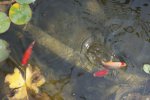 2012-06-30 at 14-54-55 original.jpg48.5 KB · Views: 227
2012-06-30 at 14-54-55 original.jpg48.5 KB · Views: 227 -
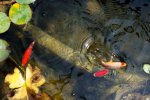 2012-06-30 at 14-54-55 auto color.jpg62 KB · Views: 223
2012-06-30 at 14-54-55 auto color.jpg62 KB · Views: 223 -
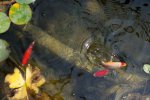 2012-06-30 at 14-54-55 auto contrast.jpg54.2 KB · Views: 223
2012-06-30 at 14-54-55 auto contrast.jpg54.2 KB · Views: 223 -
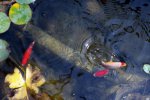 2012-06-30 at 14-54-55 auto levels.jpg57.3 KB · Views: 193
2012-06-30 at 14-54-55 auto levels.jpg57.3 KB · Views: 193 -
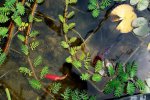 fish,plants enhanced.jpg92.9 KB · Views: 198
fish,plants enhanced.jpg92.9 KB · Views: 198 -
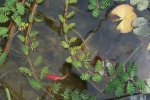 fish,plants original.jpg74.8 KB · Views: 229
fish,plants original.jpg74.8 KB · Views: 229
Yeah, I can totally buy that, there are lots of situations where your eye and brain work together in ways a camera never will. I think in most cases the camera is capturing a pretty realistic scene, where as the reality of what your naked eyes sees doesn't quite match up due to the world's most powerful computer post processing the image. Your brain.
So, the short answer is probably, yes you have some algae, your brain just doesn't need to see all of that green so it takes care of it, the camera doesn't do this.
So, the short answer is probably, yes you have some algae, your brain just doesn't need to see all of that green so it takes care of it, the camera doesn't do this.
I was also thinking the same thing, brain interpreting colors differently. And of course there certainly was green algae on the light rocks, while green algae on black liner is really hard for us to see even in a photo.
Using a white submerged background would be a better way to judge what is going on. A Secchi Disk type deal.
Post production is something I do understand (to a point) as I've written a lot of video and photo editing software. But nothing springs to mind how the green could be adjusted. I guess there is a bottom line, it's green because it's green.
Here's another case. I think this is purely an issue with reflection and I'd bet (even odds only) a polarized lens would fix. Same pond, same day.
First 2 are just from two different angles, showing each side of the pond. The first has so much reflection (I assume) nothing can be seen subsurface. The second one is generally what my eye would see in person, you can see the bottom rocks in about 2-3' of water.


This one is looking straight down, water depth is about 3' on the left and 4.5' on the far right. The pond edge really got blown out, I can't remember if I did any post on this, probably. This pond I would say looked the same as the green pond in the earlier photos, but this one is more brown which is how I thought it looked live.

Using a white submerged background would be a better way to judge what is going on. A Secchi Disk type deal.
Post production is something I do understand (to a point) as I've written a lot of video and photo editing software. But nothing springs to mind how the green could be adjusted. I guess there is a bottom line, it's green because it's green.
Here's another case. I think this is purely an issue with reflection and I'd bet (even odds only) a polarized lens would fix. Same pond, same day.
First 2 are just from two different angles, showing each side of the pond. The first has so much reflection (I assume) nothing can be seen subsurface. The second one is generally what my eye would see in person, you can see the bottom rocks in about 2-3' of water.


This one is looking straight down, water depth is about 3' on the left and 4.5' on the far right. The pond edge really got blown out, I can't remember if I did any post on this, probably. This pond I would say looked the same as the green pond in the earlier photos, but this one is more brown which is how I thought it looked live.

Looking at the pictures again the pond edge rocks in the 1st is also blown out, while there's good contrast in the second and water seem more correct. Since this was an auto camera I don't exactly what it was doing. Certainly a majority of the frame was dark so it set for that. But whether these change exposure or aperture or something else I don't know.
Based on Bucky's recommendation I think now I would go for something like the Casio EX-ZR10. I would like video too. I've been interested in learning more about photography for many years, but then I've also never made the effort when I've had the chance. So I guess this one hobby where obsession never set in...praise the lord of darkness. Just have to admit I'm a point and shoot dude. Besides...everything can be fixed in software.
Not sure the Casio would be a good teaching camera, it does what it does, and the only thing you can modify is ISO, WB, and turn the flash on and off. It takes great pictures for me and I'm sure it would do the same for you, but it's a very closed system, it won't let you make creative mistakes and learn what works and what doesn't.
If you want the results without the knowledge, then go for it, if you want both a Digital Rebel or Nikon D9000 is a better choice for just a little bit more money.
If you want the results without the knowledge, then go for it, if you want both a Digital Rebel or Nikon D9000 is a better choice for just a little bit more money.
I'm thinking of giving up on learning photography if the point and shoots are are good as I thought you were saying. I can wait for the right light. I'm on the fence, but I need a new hobby like I need another hole in my head.
lol, nice. Looks like the ZR10 is still available, only around $200 so not too shabby. The high speed feature on this camera may not be of much use to you, but it's a fun toy. In fact, I'm going to go take high speed video of my waterfall, that will be cool.
- Joined
- Jun 22, 2011
- Messages
- 4,684
- Reaction score
- 3,764
- Hardiness Zone
- 5b
- Country

WB;
a few more, followups, to the conversation. There is a consensus that upgrading your camera will do the most good, as well as some PPing, something of which you're already aware. That helps. One poster showed your pic having used an adjustment curve layer, using a certain 'gray point' from your pic to do the adjusting. I'll post it below. The arrow in red is the place he took his 'gray' point from. If you're aware of PPing, you should be following this easily. Below is his instructions as to what he did to fix your pic.
"
An easy way to fix is to use a curve and mask, apply the curve as an adjustment layer and select the gray point eye dropper (middle one) and click an area that you believe should be neutral or close to it, that should remove a lot of the yellow-green, to apply only to certain areas use the mask to paint in or out what needs to be adjusted.
here is an example, the arrow points to the area I used to click on with the gray point eye dropper."
(and the actual pic-fix is at the bottom of the post)
There was also the idea that better pics are taken on cloudy days, so bear that in mind. Blowing out highlights or muddying shadows is harder this way.
I'll post a couple of pics another poster showed, as an example of how well your fish CAN be photographed. Again, pics below, courtesy of Orlando. He did an extremely good job.
Also, there IS the real thought going that having a scene so full of green will both swarm the sensor and brain. That is, the cam isn't your brain and can't see the contextual colors surrounding, which you're picking up. And, though the sensors are geared toward replicating what the eye sees (green pixel sites are twice the quantity of the others simply as part of the algorithm that mimics the eye), greens are still going to be an issue. Much like the yellow cast of incandescent lights, but the problem is not as noted and so addressed by the software engineers. Just part of the theory, here.
I think IF you upgrade with an eye toward certain controls, manual settings, overrides for biases, wb correction ability, RAW capture, that you will get much better results without trying too hard. But I do think some PPing will definitely pull your pics from ordinary to better.
Btw, not to start a flame war, but there ARE other camera brands out there beside Nikon and Canon. It's not the camera nearly as much as the photographer, and the better photogs already know this. Sorry, had to input this as I don't like painting with so broad a brush that details are smothered.
a few more, followups, to the conversation. There is a consensus that upgrading your camera will do the most good, as well as some PPing, something of which you're already aware. That helps. One poster showed your pic having used an adjustment curve layer, using a certain 'gray point' from your pic to do the adjusting. I'll post it below. The arrow in red is the place he took his 'gray' point from. If you're aware of PPing, you should be following this easily. Below is his instructions as to what he did to fix your pic.
"
An easy way to fix is to use a curve and mask, apply the curve as an adjustment layer and select the gray point eye dropper (middle one) and click an area that you believe should be neutral or close to it, that should remove a lot of the yellow-green, to apply only to certain areas use the mask to paint in or out what needs to be adjusted.
here is an example, the arrow points to the area I used to click on with the gray point eye dropper."
(and the actual pic-fix is at the bottom of the post)
There was also the idea that better pics are taken on cloudy days, so bear that in mind. Blowing out highlights or muddying shadows is harder this way.
I'll post a couple of pics another poster showed, as an example of how well your fish CAN be photographed. Again, pics below, courtesy of Orlando. He did an extremely good job.
Also, there IS the real thought going that having a scene so full of green will both swarm the sensor and brain. That is, the cam isn't your brain and can't see the contextual colors surrounding, which you're picking up. And, though the sensors are geared toward replicating what the eye sees (green pixel sites are twice the quantity of the others simply as part of the algorithm that mimics the eye), greens are still going to be an issue. Much like the yellow cast of incandescent lights, but the problem is not as noted and so addressed by the software engineers. Just part of the theory, here.
I think IF you upgrade with an eye toward certain controls, manual settings, overrides for biases, wb correction ability, RAW capture, that you will get much better results without trying too hard. But I do think some PPing will definitely pull your pics from ordinary to better.
Btw, not to start a flame war, but there ARE other camera brands out there beside Nikon and Canon. It's not the camera nearly as much as the photographer, and the better photogs already know this. Sorry, had to input this as I don't like painting with so broad a brush that details are smothered.
Attachments
Using the color curve did produce an interesting result, much more realistic for the rock bottom. Thanks. I've always kind of drawn the line at using masks, thinking that crossed a line from being a realistic photo to convey fact into the world of art and fantasy. My photos generally are meant to convey a realistic state. But I do agree post can make the photo a more authentic depiction, so maybe I have to consider masks.
So now you have me thinking...maybe someday I'll play around with a custom color curve tool specific to adjusting green in water photos. Actually, could be a whole suite of tools specific to pond type photos. People experienced will high end post tools are able to do these things, but there's a big market for easier to use tools for the less experienced. This would also give me a good reason to learn more about photos, cameras and water.
Good tip for shooting when over cast.
Orlando's photos are indeed some of the best, if not the best, Koi photos I've seen. I can see the scales on the belly of one fish.
I agree on the camera brands. When I said "something like the Casio EX-ZR10" I meant feature wise, and even then only in general because I really don't have a good understanding of what the different features really mean. I know what each feature is, but don't have the experience to know how to use them in combination, or have a good idea what the results would be. I guess I'd get a better camera, learn, and then know better what the camera after that should be. It's like everything else in the world, there's a difference between knowing something and having experience with something. You really need both to understand something.
What is the photo forum where you're getting all this good info? I'm getting kind of maxed out on pond chatting, maybe it's time for a new subject.
Thanks to all for your time and great info.
So now you have me thinking...maybe someday I'll play around with a custom color curve tool specific to adjusting green in water photos. Actually, could be a whole suite of tools specific to pond type photos. People experienced will high end post tools are able to do these things, but there's a big market for easier to use tools for the less experienced. This would also give me a good reason to learn more about photos, cameras and water.
Good tip for shooting when over cast.
Orlando's photos are indeed some of the best, if not the best, Koi photos I've seen. I can see the scales on the belly of one fish.
I agree on the camera brands. When I said "something like the Casio EX-ZR10" I meant feature wise, and even then only in general because I really don't have a good understanding of what the different features really mean. I know what each feature is, but don't have the experience to know how to use them in combination, or have a good idea what the results would be. I guess I'd get a better camera, learn, and then know better what the camera after that should be. It's like everything else in the world, there's a difference between knowing something and having experience with something. You really need both to understand something.
What is the photo forum where you're getting all this good info? I'm getting kind of maxed out on pond chatting, maybe it's time for a new subject.
Thanks to all for your time and great info.
There ARE other camera brands, which is by I mentioned Casio. It kind of sounds like you are trying to start a flame war. Not going to work on me though, I have a 2 Nikons, 1 Canon, 1 Minolta, 1 Konica-Minolta, and 2 Casio digitals. Not going to get me worked up one way or the other. I like each camera for at least 1 reason, but if someone came along and said you cannot use X brand anymore, I'm positive I wouldn't cry about that at all.
So I assume in photography forums people get upsets mentioning different brands? Good to know if I end up in one of those forums. I guess it's kind of like suggesting Skippy isn't the greatest filter, people take it personal. I don't know a Casio from a Cannon so I appreciate any info I can get.
Ask a Question
Want to reply to this thread or ask your own question?
You'll need to choose a username for the site, which only take a couple of moments. After that, you can post your question and our members will help you out.
Similar Threads
Forum statistics
Latest Threads
-
Turtle Pond Red Mangrove victim of success!
- Started by Stephen Noble
-
Concrete lined pond and plants - please advice to very newbie
- Started by John Tired
-
Ultra sieve 111
- Started by LAK
-
Fungus?
- Started by Ana
-
He attacks again!
- Started by Chumley
-
Magnolia Bokeh
- Started by RobAmy
-
Spring has sprung in Tennessee -pic heavy
- Started by Hound Heaven
-
Whats next
- Started by Run91
-
Rapid change in "surface" algae
- Started by chibae
-
Pond Waterfall Setup Help
- Started by Acedink

